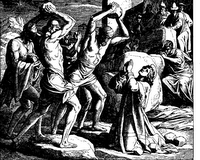Alright… I think I’ve mentally worked out a formula for these posts that seems to make sense. As we dive into these touchy passages of Scripture, we’ll do the following:
- Quote the passage in its entirety
- Restate the passage in ‘plain-er’ English terms
- Outline and respond to the major objections, one at a time
- Attempt to answer the key question “What does this mean to me today?”
I'd also caution that this first series deals with some adult themes which are not appropriate for our younger readers. If you're under 18, call you mom, confess your sin, and go read
the Rebelution (which is certainly not a punishment!)... With those things in mind, a big dose of prayer, and apologies for length... I say, "Away we go!"
Original Passage (in a Modern Translation)
We’re starting by taking a look at
Deuteronomy 22:13-21. We’ll tackle the remainder of chapter 22 in the next post. In the
ESV, our 'target' passage reads as follows:
"If any man takes a wife and goes in to her and then hates her and accuses her of misconduct and brings a bad name upon her, saying, ‘I took this woman, and when I came near her, I did not find in her evidence of virginity,’ then the father of the young woman and her mother shall take and bring out the evidence of her virginity to the elders of the city in the gate.
And the father of the young woman shall say to the elders, ‘I gave my daughter to this man to marry, and he hates her; and behold, he has accused her of misconduct, saying, “I did not find in your daughter evidence of virginity.” And yet this is the evidence of my daughter's virginity.’ And they shall spread the cloak before the elders of the city.
Then the elders of that city shall take the man and whip him, and they shall fine him a hundred shekels of silver and give them to the father of the young woman, because he has brought a bad name upon a virgin of Israel. And she shall be his wife. He may not divorce her all his days.
But if the thing is true, that evidence of virginity was not found in the young woman, then they shall bring out the young woman to the door of her father's house, and the men of her city shall stone her to death with stones, because she has done an outrageous thing in Israel by whoring in her father's house. So you shall purge the evil from your midst."
In Plain English
A man accuses his wife of not being a virgin at the time of their marriage - a very serious charge. In her defense, her father can present evidence of her virginity to the elders of the city who would serve as judges over the dispute. If she is proven to have been a virgin, the man is punished with the whip, the father is compensated, and the daughter remains married. If her purity had been violated prior to her marriage, she is executed.
I never said these passages were comfortable! Likewise, you can probably imagine more objections than I can handle here. Nonetheless, I’ll try to respond to the big ones in order…
Objections
What’s the big deal, anyway? Is it such a big deal that she’s not a virgin?
To God it is… Marriage was established by God as the union of one man and one woman. God proclaimed after creating woman that she and the man would “become one flesh” - almost literally becoming one, unified being out of two. That union of soul and body is perhaps most vividly experienced in the sexual act. I think that if we’re honest, we’d admit that part of sex’s power is the emotional/spiritual connection that happens between two lovers.
Practically speaking, that’s why
chastity is such a big deal and is the entire point of the passage. Every time we engage in sex outside of God’s plan we’re polluting our potential connection to a future spouse and thumbing our noses at God's plan/authority. I’ve talked with several men who’ve had “colorful” sexual histories and later gotten married. The amount of sexual frustration and temptation they often feel is amazing. The reason is that they can’t help but compare and contrast their spouse with the memories of previous partners (“She had great legs, that one was very sensual, etc.”).
Pornography, as numerous studies have shown,
has a similar effect by causing us to create a Playboy mistress in our heads that with whom our wives must unknowingly compete. More insidiously, our
lust becomes so enflamed that almost any woman can become a sexual object in our mind’s eye.
So, sexual purity is important both as a practical virtue and as honoring to God’s model for the family and for our lives.
GROSS! You mean they kept evidence? What evidence could there be?What is clear is that the father of the accused girl was reasonably expected to have some evidence of his daughter’s virginity. The specific nature of the evidence is not as clear. The most popular guess seems to be that the parents of the daughter were presented with the sheets from the marriage bed (which would show some blood).
While this grosses us out, we mustn’t simply discard this because of our modern sensibilities… Again, the honor of the new wife and her family was at stake in her pure status at marriage. As a result, the exchange of some symbol of that purity would be sensible. I’ve read that in some cultures the first night a couple spends together is attended by the matriarchs of both families. The women guide and instruct the young couple in their consummation of the marriage. I’m not saying this doesn’t weird me out, but that’s my socio-cultural perspective rather than something objective.

You might say that, in a modern context, the bloody sheets would be a bad indicator of purity anyway. Many young girls today rupture their hymen though normal physical activity before they ever engage in intercourse. Remember, however, remember that girls often married younger in days of old
and were not usually engaged in the same kinds of physical play/work that our teenagers are.
Ok… Enough of the icky stuff.
So, the man gets whipped and the girl has to stay married to him. Is that really fair?In asking this question, you’re missing the overarching point of the passage. The issue here is the high value of purity. In our example, the purity of the young woman has been effectively compromised -
by her husband on their wedding night.
The young man’s offense is perhaps worthy of death… But if they kill him, who will take care of the young (then widowed) woman? While she
might find another husband, it’s not likely. Her father will only be able to care for her until his passing. And she wouldn’t be able to have any children which, although we view them as optional now, were a key part of her self-image and identity in her culture.
So, the young man is beaten (and Jewish commentaries seem to indicate this was pretty severe) and forced to care and provide for the wife he tried to wrong as long as he lives. In the end, this seemingly contradictory statement is actually intended to be a very loving provision.
So, the guy gets to live, but the girl gets stoned. Why can’t she just get a whipping?Two possibilities here, both of which I think have some validity.
1) To assume that she should be (only) whipped implies that the husband’s sin is not also deserving of death. As we noted above, if he had falsely accused her it is likely that he would face execution
except that his death would leave the young widow in dire circumstances. Who would care for her and provide for her? So while both sins are equal, differing punishments are handed down to protect the wronged wife’s life and well-being.
If the wife lied and concealed her prior fornication, she is subject to the same sentence. However, her execution will not negatively impact her husband’s well-being… Therefore, the humanitarian restraint show above is voided and the full punishment for the sin is felt.
 2)
2) Perhaps hers is the greater sin. Though this sounds harsh, there is at least some basis to make the case. In
verse 28 of the same chapter, we read that an unbetrothed woman could have sexual relations with a man and it is not a capital offense. In this case, one might infer that he issue isn’t really that she had sex before marriage. While that is dishonorable and a punishable crime, it isn’t deserving of the death penalty.
Her execution would seem to be because she
knowingly engaged in prohibited sexual conduct and hid the fact from both her new husband and her father.
Matthew Henry, one of the few commentators with the stones to muck around in these passages says the following:
This gave a powerful caution to young women to flee fornication, since, however concealed before, so as not to mar their marriage, it would very likely be discovered afterwards, to their perpetual infamy and utter ruin. [Likewise,] it is intimated to parents that they must by all means possible preserve their children's chastity, by giving them good advice and admonition, setting them good examples, keeping them from bad company, praying for them, and laying them under needful restraints, because, if the children committed lewdness, the parents must have the grief and shame of the execution at their own door.
 John Calvin
John Calvin states that the issue is fraud:
If the punishment should seem to anybody to be somewhat too severe, let him reflect that no kind of fraud is more intolerable. A false sale of a field or a house shall be accounted a crime, as also the utterance of false money; and, therefore, she who abuses the sacred name of marriage for deception, and offers an unchaste body instead of a chaste one, much less deserves to be pardoned. The cause of severity, however, which is expressly mentioned, is much more extensive, i.e., because she hath wrought wickedness, or filthiness in Israel.
Either way, “Yipes”.
SO, WHAT DOES THIS SAY TO US TODAY?
Why are passages like this in the Bible? There are many people who wish so strongly that they weren’t! We often feel like Christianity would be “so easy to sell” if we could just market the message without these things tripping us up.
But these passages are speaking to us - yes, even today - as well. Personally, I think the following points are particularly applicable:
1) God’s condescension to us - Everything we’re discussing in Deuteronomy 22 is essentially an exposition and unpacking of a couple of the Ten Commandments.

It’s kinda like a can of white, latex paint that says “Do not substitute for mayonnaise”… Whenever we see warnings like that, we just stop to imagine
what idiotic behavior called for that warning or attorney was covering all his bases.
The Lord graciously discuessed even minute, deviations from the norm and how to have them handled. God could’ve chosen to just smoke the offenders, but instead graciously laid out the rules so we all knew them in detail.
2) God’s zeal for the family - God created the first family and He declared it good. This institution is precious to Him and should be to us. In marriage, we find wonderful joy and see a reflection of God’s own nature - the interweaving of two people into one unit being like the relation of the Father, Son, and Spirit
3) The prize of purity - Our sexual purity displays itself as both honor and virtue. By remaining pure, we effectively love and honor our spouse before we ever meet them. Similarly, we honor God by holding to the standard that He has set for us. We take care of those things that are dear to us and ensure that the real treasures are carefully preserved. Our bodies are not our own, they belong to both God and our spouses… What greater gift do we have?
4) The need for discipline - A while ago, I got in a discussion with someone re: church discipline and whether or not we should ‘break fellowship’ with Christians who are living in sin. I think this passage supports the case that we should. Israel was a covenant community, living in submission to God and seeking to obey His Law. When the laws were transgressed, there were penalties (up to, and including, death). In a similar way, when we enter the covenant community of a church, we are making the same statement: We want to live for God, in submission to His Laws, in community with His people. If we fail to ‘purge the evil from our midst’, we do a disservice to everyone involved.
Don’t misread me… I think that stonings fall from fashionable is something we should be happy about. But we need to call sin for what it is, and deal with it.
5) The wickedness of man - I think we can agree that it takes a pretty despicable person to attempt to knowingly dishonor someone he claims to have loved. In this case by challenging his wife’s chastity, the husband scorns the girl and her family at best. At worst, he puts her very life in danger. As extreme as this is, the wickedness in the heart that would dare to do such a thing is present in all of us.
The key phrase here, which will become more obvious in the coming verses, is the end of verse 21:
“So you shall purge the evil from your midst.” But more on that next post (on the rest of the chapter)…
Labels: Bible
 Eva, the kids, and I all travelled to Maine this weekend to attend a memorial service for Eva's grandfather, Roy Beane. Shortly after Roy passed away, Eva mentioned that my mother-in-law and Roy's wife wanted me to say a prayer at the funeral... I guess I've become known as the 'religious one'. As it turns out, what they actually wanted me to do was officiate the whole funeral. Not something you like to find out 1 minute before you are expected to start talking.
Eva, the kids, and I all travelled to Maine this weekend to attend a memorial service for Eva's grandfather, Roy Beane. Shortly after Roy passed away, Eva mentioned that my mother-in-law and Roy's wife wanted me to say a prayer at the funeral... I guess I've become known as the 'religious one'. As it turns out, what they actually wanted me to do was officiate the whole funeral. Not something you like to find out 1 minute before you are expected to start talking. ttle more than "good fishin' stories". Obviously, here was a person who was deeply loved by many (myself included) but the things that live on past him are fleeting recollections of pleasure. Please don't misunderstand... I want my son and daughter to remember wrestling, fishing, and all those kinds of things when I'm gone, too! Those fun memories are important. But more than that, I hope they remember my faith, the character I struggled maintain (succeeding only in my better moments), my deep love for them and their Mom, and that life is more than people, places, and things.
ttle more than "good fishin' stories". Obviously, here was a person who was deeply loved by many (myself included) but the things that live on past him are fleeting recollections of pleasure. Please don't misunderstand... I want my son and daughter to remember wrestling, fishing, and all those kinds of things when I'm gone, too! Those fun memories are important. But more than that, I hope they remember my faith, the character I struggled maintain (succeeding only in my better moments), my deep love for them and their Mom, and that life is more than people, places, and things. Just to end on a lighter note: I hope that having my first official act the supervision of a funeral is not going to somehow define the rest of my ministry. On a related note, I did a good enough job that one member of the extended family "just had to tell me that [he thought] I should become a God-damned preacher".
Just to end on a lighter note: I hope that having my first official act the supervision of a funeral is not going to somehow define the rest of my ministry. On a related note, I did a good enough job that one member of the extended family "just had to tell me that [he thought] I should become a God-damned preacher".

























